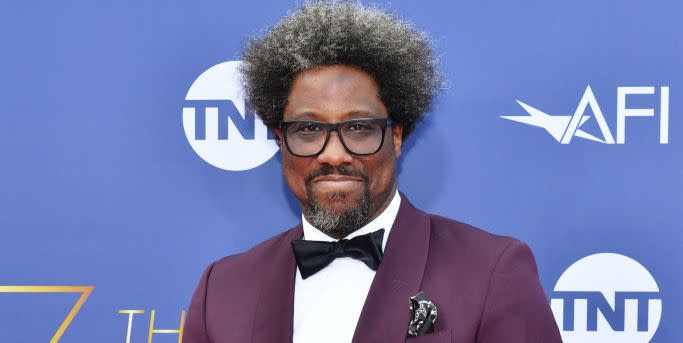W. Kamau Bell Says Comedy 'Is a Survival Mechanism'

- Oops!Something went wrong.Please try again later.
- Oops!Something went wrong.Please try again later.
"Hearst Magazines and Yahoo may earn commission or revenue on some items through these links."
When the perilous state of the world gets too overwhelming, making you feel powerless in the face of inequality and oppression, it can be hard to know what to do.
W. Kamau Bell wants to laugh.
Comedian, author, and host of CNN's United Shades of America W. Kamau Bell recently sat down with psychiatrist and Men's Health adviser Dr. Gregory Scott Brown on the Instagram Live show Friday Sessions, discussing Black men's mental health and comedy as power.
Bell says when it comes to dealing with the state of the world — especially as a person of color in America at this moment in history — it's essential to honor your emotions and "feel what you're feeling." Citing political unrest, the Covid-19 pandemic, and gun violence as examples, Bell emphasizes that these realities have an impact on our collective lives and mental health.
"If you are an empathetic, sympathetic person—which many of us are and we all should be—you have to recognize that this is actually really happening," Bell says. "I always say, 'We are living in the part of history that people write about.'" (Bell is author of Do the Work: An Antiracist Activity Book.)
He adds, "We have to recognize this stuff all affects us. So don't pretend that it doesn't."
If you are an empathetic and sympathetic person, honoring these feelings can often lead you to want to take action. Many times, that action involves having uncomfortable conversations, something in which Bell excels. Throughout his work on United Shades of America, Bell has participated in conversations with KKK members, right-wing extremists, and anti-trans legislators. He says the most important thing he's learned through all these tense conversations is to "shut up and listen."
"When you feel emotionally charged by a moment, just sit with it," Bell says. "Sit with it and see what happens. The more that you sit with those moments and let other people talk, the more they will feel comfortable talking and reveal themselves in ways they didn't think they were going to reveal themselves."
Though he encourages having conversations, Bell specifies that there's power in knowing your limits and honoring them to preserve yourself from unjust harm.
"The world never changed in one conversation," he says of the occasional necessity of walking away.
Bell says addressing injustice is often easier when speaking from a place of privilege, pointing to the concept of meaningful and intentional allyship. For example, when it comes to addressing racism, often white folks can have more power to shift minds than people of color.
"Unfortunately in America, a white person's whisper is louder than a Black person's scream," he said, "So if a white person says, 'I think there is racism around here,' more people tend to pay attention than if a Black person says it."
To process ever-present racism, generational trauma, and harrowing current events, Bell says he's turned to weekly therapy over the past couple of years as a coping mechanism. Acknowledging barriers in mental healthcare access and affordability, Bell says therapy is more about showing up and doing the work than expecting radical results.
"It's like going to the gym," Bell says. "You can't always go to the gym and set your personal best. You just have to go to the gym because you're trying not to die."
He adds, "Most of us don't have an hour where we can just unzip ourselves, and I think that's an important part of therapy."
Outside of therapy, part of processing trauma for Bell is, predictably, comedy. The comedian views comedy as a way to process and relieve tension created by oppression, describing laughter as a form of reclaimed power.
"Comedy, for me, is a survival mechanism," Bell says. "If you make some laugh, for a moment they are submitting to you...and the more you make them laugh, the less control they have. There's a reason why, throughout the history of this country, often the most oppressed groups had the best comedians. It's not an accident."
"I don't how Black folks or Indigenous folks would have made it through the history of this country without humor," he adds. "I don't think it's possible."
Watch the entire Friday sessions chat below:
You Might Also Like

